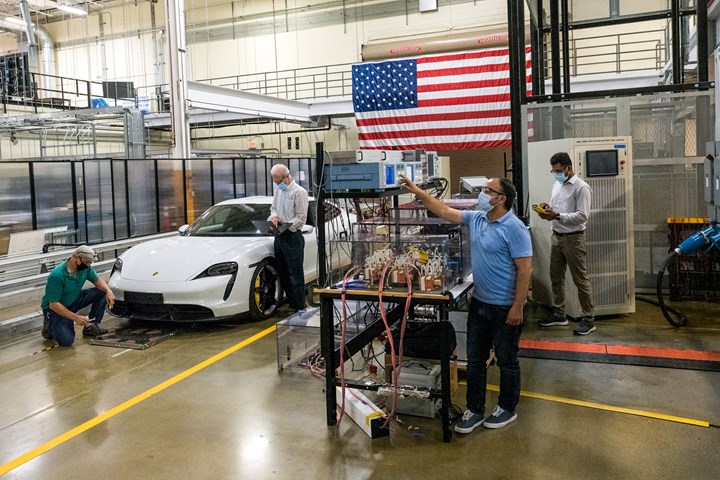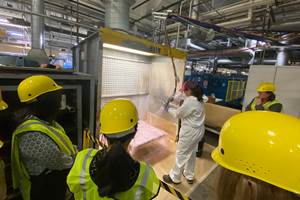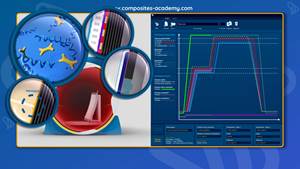Volkswagon launches new research collaboration with ORNL, University of Tennesse, Knoxville
Projects involve integration of advanced functional materials, novel recycling and wireless charging concepts to support electric mobility and sustainable transportation.

Oak Ridge National Laboratory (ORNL) researchers work in the Extreme Fast-Charging Lab in ORNL’s Grid Research Integration and Deployment Center. Photo Credit: Carlos Jones/ORNL, U.S. Dept. of Energy
Volkswagen Group of America’s (Herndon, Va., U.S.) Innovation Hub Knoxville (Tenn., U.S.), the company’s technology unit for applied materials science, has expanded its research collaboration with Oak Ridge National Laboratory (ORNL, Knoxville, Tenn., U.S.), reported to be the largest U.S. Department of Energy (DOE) science and energy laboratory, and the University of Tennessee, Knoxville (UT). The expanded collaboration aims to explore how to integrate breakthroughs in material science and recycling concepts — including fiber-reinforced composites — to support electric mobility and sustainable transportation. The first project involves testing ORNL’s new high-power wireless EV charging concepts with a Porsche Taycan.
“We aim to leverage the unique knowledge and innovative power the Tennessee Valley holds,” says Scott Keogh, president and CEO at Volkswagen Group of America Inc. “Volkswagen is focused to push electric mobility and new technologies for more sustainable transportation. Expanding our research collaboration with Oak Ridge National Laboratory and the University of Tennessee will help drive these efforts.” The expanded working relationship is just another example of Volkswagen’s growing engineering and technology footprint in the U.S., Keogh adds.
The interdisciplinary teams have started testing new wireless charging concepts for electric vehicles (EVs), with the goal to develop a higher power wireless charger through breakthrough designs that focus electromagnetic waves to eliminate interference, thus increasing efficiency. In the first trials, a prototype system has shown a high level of efficiency, with up to 98% of the energy used (coil-to-coil) reaching the vehicle battery.
“We are excited to work with Volkswagen to demonstrate ORNL’s high-powered, ultra-efficient wireless charging technology,” says Xin Sun, associate laboratory director for Energy Science and Technology at ORNL. “Our unique polyphase electromagnetic coil design and power electronics provide high power transfer levels in a compact system, with the potential to alleviate EV range anxiety and speed the decarbonization of the U.S. transportation sector.” The wireless charging project is supported by the DOE Office of Energy Efficiency & Renewable Energy’s Vehicle Technologies Office.
Using Volkswagen’s expertise in vehicle integration, the teams also have been able to build from a charging power level of 6.6 kilowatts up to 120 kilowatts, with a goal of 300 kilowatts, enough to provide an 80% recharge of the Porsche Taycan in about 10 minutes. The research project aims to generate new insights into the technological and physical hurdles of high-power wireless charging for automobiles.
Other research projects at Volkswagen’s Innovation Hub Knoxville focus on advanced functional materials, including composite car body parts and plant-based materials for future interior designs. The team is also working on new recycling concepts for materials conventionally deemed non-recyclable, such as fiber-reinforced composites.
“Our work with Volkswagen fits with our vision to create a more just, prosperous, and sustainable future through our research,” says Deb Crawford, UT Knoxville vice chancellor for research and innovation. “Volkswagen is a model innovation partner, and understands the value that co-location with a world-class research university creates. Together, we are identifying technological solutions that could lead to a more sustainable future for our planet.”
Volkswagen is a member of the Institute for Advanced Composites Manufacturing Innovation (IACMI, Knoxville, Tenn., U.S.), a research and innovation consortium funded at UT by the DOE. Volkswagen also works closely with UT Chattanooga, an MBA program that lets its employees earn the degree by taking classes at the Chattanooga assembly plant or on campus.
Volkswagen Group of America opened its Innovation Hub Knoxville in early 2020, in partnership with UT. Since then, the unit has established working relationships with universities and key researchers in the region. The Innovation Hub Knoxville joins the global Volkswagen Group’s larger innovation ecosystem, including innovation centers in Belmont, California; Wolfsburg, Germany; and Beijing, China, along with hubs in Barcelona, Spain; Tel Aviv, Israel; and Tokyo, Japan.
“The global Volkswagen Group aims to build a more sustainable vision of future mobility worldwide, and we connect the best researchers in the world to make that a reality,” concludes Nikolai Ardey, executive director group research at Volkswagen Group. “Co-innovating with partners like Oakridge National Laboratory and the University of Tennessee helps to multiply the power of Volkswagen’s international innovation team.”
Related Content
Women in the Composites Industry brings together women for networking, educational opportunities
Aiming to support the growth of women in this industry, the WCI industry group and its partners recently held its first live training event hosted by Owens Corning.
Read MoreNew online training course targets prepreg basics
JEC World 2024: Composites Expert highlights how its E-Learning Composites Academy platform supports flexible industry learning with new courses developed with Stelia Aerospace North America.
Read MoreNASA names university teams for aeronautics research challenges
As part of the agency’s University Leadership Initiative, three multidisciplinary teams will address topics related to growth in AAM, while a fourth examines electricity generation for future airliners.
Read MoreThe Native Lab launches composites course training membership plan
Courses that touch on the fundamentals of composite materials, design, analysis and more are available for individuals and companies alike through TNL’s online platform.
Read MoreRead Next
“Structured air” TPS safeguards composite structures
Powered by an 85% air/15% pure polyimide aerogel, Blueshift’s novel material system protects structures during transient thermal events from -200°C to beyond 2400°C for rockets, battery boxes and more.
Read MoreVIDEO: High-volume processing for fiberglass components
Cannon Ergos, a company specializing in high-ton presses and equipment for composites fabrication and plastics processing, displayed automotive and industrial components at CAMX 2024.
Read MoreAll-recycled, needle-punched nonwoven CFRP slashes carbon footprint of Formula 2 seat
Dallara and Tenowo collaborate to produce a race-ready Formula 2 seat using recycled carbon fiber, reducing CO2 emissions by 97.5% compared to virgin materials.
Read More














.jpg;maxWidth=300;quality=90)











